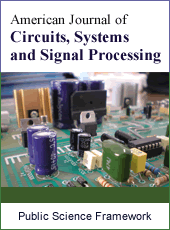American Journal of Circuits, Systems and Signal Processing
Articles Information
American Journal of Circuits, Systems and Signal Processing, Vol.1, No.2, Jun. 2015, Pub. Date: May 20, 2015
Challenges in Requirement Elicitation of Cellular Applications: For Visually Challenged People
Pages: 32-37 Views: 4829 Downloads: 1410
[01]
Anam Ashraf, Department of Computer Software Engineering, National University of Sciences and Technology (NUST), Islamabad, Pakistan.
Blindness is a loss of sight and there are innumerable causes of blindness due to abnormal functioning of eyes impacting on cognitive development. Different traditional techniques and methods have been used to guide people who are visually challenged. Researchers and developers have come up with multiple innovative ideas to aid Visually challenged people to perform their routine tasks. As visually challenged people do not visualize world properly so requirement engineers face number of challenges while eliciting requirements from them. This paper focuses on the challenges faced during the requirement elicitation process. As challenges are discussed we have proposed a solution to overcome these problems.
Visually Challenged, Mobile Computing, Requirements Engineering, Software Engineering, Smartphone
[01]
(November, 2012), impact of visuall imapirment? [Online] Available: http://www.tsbvi.edu/infants/3293-the-impact-of-visual-impairment-on-development.
[02]
(November, 2012), what is visual impairment? [Online]http://nichcy.org/disability/specific/visual impairment.
[03]
http://www.tsbvi.edu/infants/3293-the-impact-of-visual-impairment-on-development.
[04]
(November, 2012), blindness statistics [Online] Available:https://nfb.org/blindness-statistics.
[05]
N.M.A. Munassar and A. Govardhan, ―A Comparison Between Five Models of Software Engineering‖, International Journal of Computer Science Issues, Vol. 7, Issue 5, pp. 94-101, 2010.
[06]
J. A. Jacko, and H. S. Vitense, “A Review and Reappraisal of Information Technologies Within A Conceptual Framework for Individuals with Disabilities,” Universal Access in the Information Society, vol. 1, no. 1/June, 2001, pp. 56-76, 2004.
[07]
J. Coughlan and R. Manduchi, “Functional Assessment of a Camera Phone-Based Wayfinding System Operated by Blind Users”, in Conference IEEE-BAIS, Research on Assistive Technologies Symposium, 2007.
[08]
J. Rajamaki et al., “LaureaPOP Indoor Navigation Service for the Visually Impaired in a WLAN Environment”, in Proc. 6th WSEAS Int. Conf. on Electronics Hardware, 2007, pp. 96-101.
[09]
M. Turunen et al., “Design of a Rich Multimodal Interface for Mobile Spoken Route Guidance”, in Proc. Interspeech, 2007, pp. 2193-2196.
[10]
S. Bohonos et al., “Universal Real-Time Navigational Assistance (URNA): An Urban Bluetooth Beacon for the Blind”, in Proc. 1st Int. Workshop on Systems and Network Support for Healthcare and Assistive Living Environments, 2007, pp. 83-88.
[11]
S. Willis and S. Helal, “RFID Information Grid for Blind Navigation and Wayfinding”, in Proc. 9th IEEE Int. Symposium on Wearable Computers, 2005, pp. 34-37.
[12]
Hurlbut, Russell R., “The Three R’s of Use Case formalism: Realization, Refinement, and Reification”, htt~://www.iit.edu/-rhurlbut/xpt-tr-97-06.html.
[13]
Miguel A. Teruel, Elena Navarro, VíctorLópez-Jaquero, Francisco Montero, Pascual González, “An Empirical Evaluation of Requirement Engineering Techniques for Collaborative Systems,” in Proceedings of EASE 2011, Darham, 2011,pg.114-123.
[14]
Cockburn, A., Writing Effective Use Cases, Addison-Wesley, 2000.
[15]
R.V.S. Balan and M. Punithavalli, "Software Architecture, Scenario and Patterns," International Journal of Computer Science Issues, Vol. 7, Issue 5, pp. 418-423, 2010.
[16]
A. Holzinger, ―Usability Engineering Methods for Software Developers,‖ Communications of the ACM, Vol. 48, Issue 1, pp. 71-74, 2005.
[17]
(April 2013), Google Inc., 2010. Google Docs. [Online] Available at: https://docs.google.com.
[18]
Ian Sommerville, "Software Engineering", Addison. Wesley, 7th edition, 2004.
[19]
C. McPhee, Dr. A. Eberlein, “An Approach to Evaluating Requirements Engineering Methods for Applicability to Time-to- Market Projects,” in Proceedings of the 13th International Conference on Software & Systems Engineering and their Applications, ICSSEA2000, Paris, France, 2000.
[20]
Tuure “A New Perspective on Requirements Elicitation Methods” Journal of Information Technology Theory and Application 5 (3), pp. 45-62, 2003.
[21]
Seyff, N., P. Grünbacher, N.A.M. Maiden, A. Tosar, “Requirements Engineering Tools Go Mobile,” in Proceedings of the 26th IEEE Int. Conf. on Software Engineering. 2004: IEEE CS.
[22]
JaeJoon “Quality Requirement Elicitation for the Architecture Evaluation of Process Computer Systems”, Software Engineering Conference Eighth Asia-Pacific pp 335 – 340, 2001.
[23]
M. Geisser, T. Hildenbrand, F. Rothlauf, C. Atkinson, “An Evaluation Method for Requirements Engineering Approaches in Distributed Software Development Projects,” Software Engineering Advances, 2007, ICSEA 2007, pg.34.
[24]
(June, 2014), Requirements Engineering for Business Apps [Online] Available: http://www.codeproject.com/Articles/251823/Requirements- Engineering-for-Business-Apps.
[25]
C. McPhee, Dr. A. Eberlein, “An Approach to Evaluating Requirements Engineering Methods for Applicability to Time-to- Market Projects,” in Proceedings of the 13th International Conference on Software & Systems Engineering and their Applications, ICSSEA2000, Paris, France, 2000.
[26]
T. Tuunanen, K. Peffers, and C. E. Gengler, “Wide Audience Requirements Engineering (WARE): a Practical Method and Case Study,” Helsinki School of Economics, Helsinki, September 2004.
[27]
S.Hebler, T. Tuunanen and K. Peffers, “Blind User Requirements Engineering for Mobile Services,” in 15th IEEE International Requirements Engineering Conference, Dehli, 2009, pg-205.
[28]
K. Peffers, C. Gengler, and T. Tuunanen, "Extending Critical Success Factors Methodology to Facilitate Broadly Participative Information Systems Planning," Journal of Management Information Systems, vol. 20, pp. 51-85, 2003.

ISSN Print: 2381-7194
ISSN Online: 2381-7208
Current Issue:
Vol. 6, Issue 1, March Submit a Manuscript Join Editorial Board Join Reviewer Team
ISSN Online: 2381-7208
Current Issue:
Vol. 6, Issue 1, March Submit a Manuscript Join Editorial Board Join Reviewer Team
| About This Journal |
| All Issues |
| Open Access |
| Indexing |
| Payment Information |
| Author Guidelines |
| Review Process |
| Publication Ethics |
| Editorial Board |
| Peer Reviewers |


